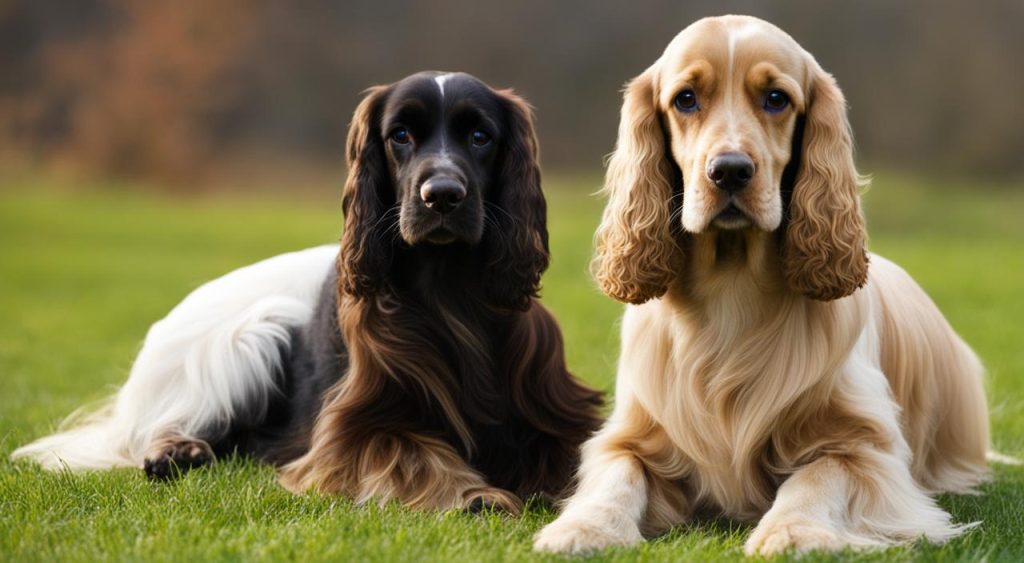When considering a new pet, it’s important to take allergies into account, especially if you or someone in your family suffers from pet allergies. Many people wonder if English Cocker Spaniels are hypoallergenic, making them a suitable choice for families with allergies.
While there is no such thing as a completely hypoallergenic dog, certain breeds are known for being more allergen-friendly. In this article, we will explore if English Cocker Spaniels fall into this category.
Key Takeaways:
- English Cocker Spaniels are not considered completely hypoallergenic, but their dander may cause fewer allergic reactions compared to other breeds.
- Individuals with allergies should consider their specific sensitivities when choosing a dog breed.
- Proteins in dog saliva, urine, and dander can still trigger allergic reactions in sensitive individuals, regardless of the breed.
- Cocker Spaniels have a moderate shedding rate and a double coat that requires regular grooming to manage their shedding and reduce dander in the environment.
- It’s essential to consider lifestyle factors, such as the size and lifespan of the breed, when deciding if an English Cocker Spaniel is the right choice for your family.
Understanding Hypoallergenic Dogs
While there is no such thing as a completely hypoallergenic dog, some breeds are known to shed less and produce fewer allergens. The notion of hypoallergenic dogs originated from the belief that low-shedding dogs would produce fewer allergens.
However, proteins in dog saliva, urine, and dander can still cause allergic reactions in sensitive individuals. These proteins can trigger symptoms such as itching, sneezing, and respiratory distress.
Each person’s immune system may respond differently to various breeds, so it’s important to consider individual allergies when selecting a dog. Your response to dog breeds depends on several factors, including the specific proteins they produce.
“The proteins in dog urine, saliva, and dander are the main culprits when it comes to triggering allergic reactions in susceptible individuals. These proteins can become airborne or stick to surfaces, making them difficult to avoid entirely.”
Therefore, even if a dog is considered low-shedding or hypoallergenic, it doesn’t guarantee that you won’t experience any allergic symptoms. It’s crucial to spend time with a dog of the specific breed you are considering and observe your individual response.
By understanding the proteins in dog urine, saliva, and dander, you can make a more informed decision about which hypoallergenic dog breeds may be a better fit for your allergies.
If needed:
Proteins in Dog Urine: Some individuals may be sensitive to proteins present in dog urine. These proteins can become aerosolized, causing allergic reactions when inhaled or coming in contact with the skin.
Proteins in Dog Saliva: Dog saliva contains proteins that can trigger allergic reactions in susceptible individuals. When dogs groom themselves, their saliva can dry on their fur and then become airborne, leading to allergy symptoms.
Proteins in Dog Dander: Dog dander consists of tiny skin flakes that are shed by dogs. Proteins in dog dander can become airborne and stick to surfaces, making it challenging to completely eliminate them from the environment.
Cocker Spaniels and Allergies
Cocker Spaniels are not hypoallergenic, but they may be a better choice for individuals with allergies compared to some other breeds. In allergen research, it has been found that Cocker Spaniel saliva causes fewer allergic reactions than dander. Their flowing and feathery coat comes in various colors and has been studied for its allergenic properties. While they moderately shed and have a double coat, regular grooming, including daily brushing and proper bathing, can help manage their shedding and reduce dander in the environment.
Conclusion
In conclusion, Cocker Spaniels are not hypoallergenic, but they may be a suitable choice for individuals with allergies due to their low allergenic properties. While they do shed moderately and have a double coat, regular grooming can help manage their shedding and reduce the presence of allergens in the environment.
Cocker Spaniels have a lifespan of around 12-14 years, providing long-term companionship for their owners. With an average size of 14-15 inches tall and weighing between 20-30 pounds, they are a medium-sized breed that can fit well into various lifestyles and living situations.
When considering a Cocker Spaniel or any other dog breed, it’s important to take into account individual allergies and lifestyle factors to ensure a compatible match. While there are no completely hypoallergenic dogs, understanding the shedding, lifespan, and size of a breed can assist in making an informed decision about your next furry companion.





